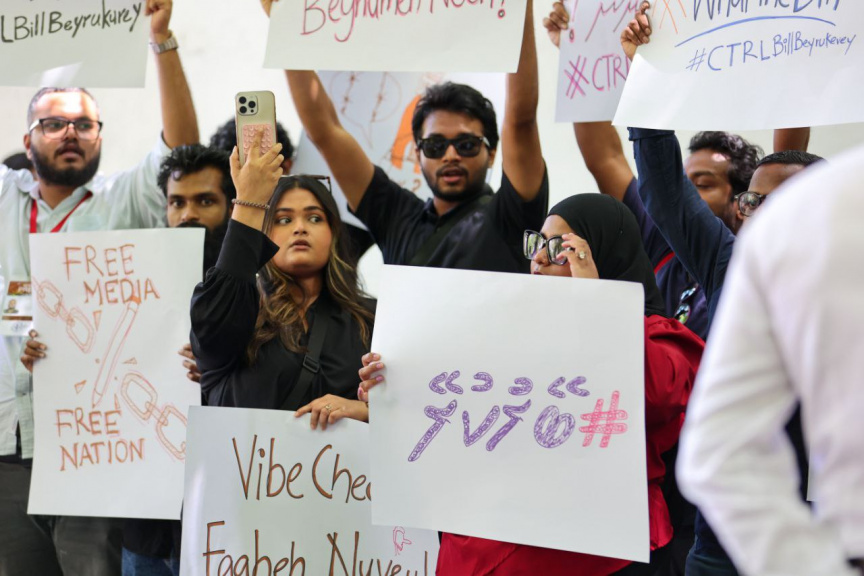
Journalists protest against the media control bill outside the Parliament building on August 27, 2025. (Sun Photo/Maaniu Mohamed)
Reporters sans Frontieres (RSF), globally known as Reporters Without Borders, has called for the withdrawal of the media bill in Parliament, stating it is an attack on Maldives' freedom of the press.
The bill, introduced by Thulhaadhoo Independent MP Abdul Hannan Abubakr, has been accepted in parliament despite ongoing protests from journalists and media professionals alike. The Independent Institutions Committee of Parliament has also commenced work on the bill.
The RSF issued a statement expressing concerns over the bill, specifically highlighting the possibility of fining media outlets and individual journalists, and the establishment of a commission with government powers.
The association called for the bill to be withdrawn immediately and urged the government to seek consultation with the media and experienced journalists.
Celia Mercier, Head of the RSF South Asia Desk, described the bill as a direct attack on Maldives' free press.
"This bill is a direct attack on press freedom in the Maldives. By entrusting media regulation to a commission under the direct influence of the executive branch and introducing disproportionate penalties, it will encourage censorship."
The association called for the bill to be withdrawn, while the Independent Institutions Committee has decided to meet with the media regarding the bill. This decision followed vociferous protests from journalists, who demanded the bill's withdrawal.
Journalists are concerned that the bill was introduced in Parliament without any consultation with them and that it contains provisions facilitating government control of the media. Consequently, journalists called for the bill to be rejected as is and a new bill to be submitted with their consultation and opinion.
President Dr. Mohamed Muizzu met with reporters on Thursday, stating the government is '100 percent pro-media' and will propose amendments to certain articles in the bill.
At a press conference on the same day, Attorney General Ahmed Usham said he did not believe the bill should be withdrawn. Journalists boycotted the Attorney General's press conference at the President's Office regarding the bill, alleging he was misleading them.
Establishment of a Maldives Media and Broadcasting Commission. This new commission would be responsible for overseeing media operations.
Three members would be appointed by the President, with the remaining four elected by the media.
The President would appoint the commission's head.
Fines ranging from MVR 5,000 to MVR 25,000 would be imposed for failing to rectify issues as per the commission’s order.
Media outlets could face fines up to MVR 100,000 for actions deemed illegal or against amended laws.
The commission would have the power to temporarily cancel a media outlet's registration upon commencing an investigation.
The commission could annul a registered media outlet before court proceedings are concluded.
The commission would have the authority to block news websites, tabloid channels, and stop TV broadcasts.
The commission could revisit cases from up to a year before its establishment and take action on them.
The President has previously stated his disinterest in controlling the media and has asked PNC members to pass the bill without granting him any additional powers, as the bill currently implies.